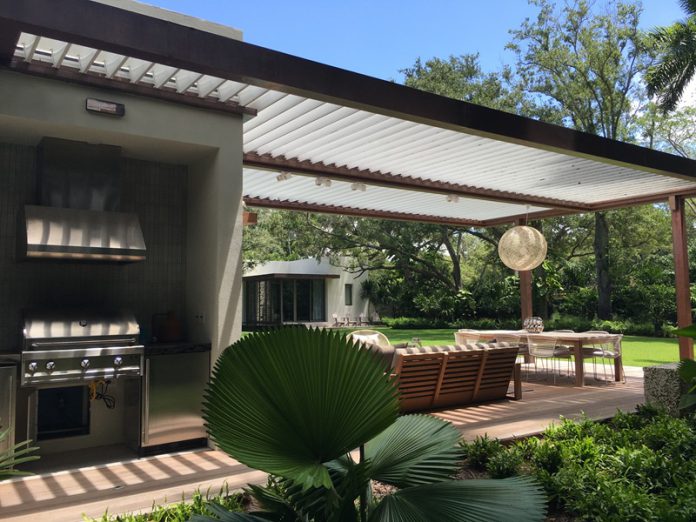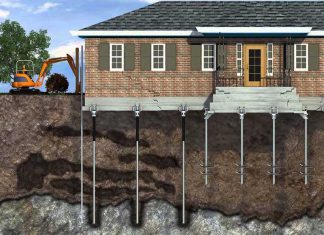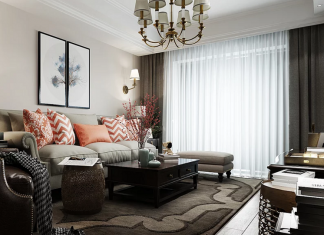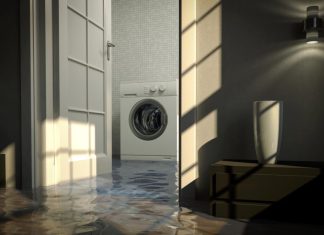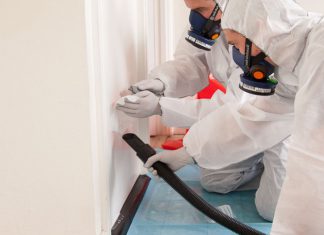Warm weather distinguishes Florida as a state, while hurricanes present a regular danger during the year. The combination of damaging winds and heavy rain with flying objects presents severe destruction risks to houses, thus requiring homeowners to build structures that are resistant to storms. The quality of outdoor space protection depends heavily on selecting proper patio cover materials that must endure severe weather conditions.
One of the best options for hurricane-resistant patio covers is an insulated aluminum roof. The lightweight strength of aluminum stands out against wooden or vinyl materials because it resists powerful winds and heavy rain with exceptional capability. The combination of insulation with the material improves temperature control by enabling outdoor areas to stay comfortable during all seasons. Florida residents who choose the perfect patio cover for their property gain protective benefits alongside the establishment of elegant backyard areas.
Why Hurricane-Resistant Patio Covers Are Essential
Hurricane storms create wind speeds surpassing 150 mph which leads to serious damages to houses as well as outdoor frameworks. The first casualty of strong storms frequently turns out to be patio covers constructed from wood or fabric and inferior materials. During storms, the weak patio covers pose a threat when they break loose and broadcast objects, which create dangers for vehicles and houses.
Homeowners throughout Florida need to select impact-resistant materials for their structures because the state imposes strict building standards that apply especially in danger areas. A suitable patio cover needs to be built to resist destruction from powerful hurricane winds, torrential rainfall, and airborne debris. The preference for aluminum and steel exists because the materials deliver strength without requiring heavy additional weight. Buying sturdy patio shelters will maintain outdoor furnishings and home exterior protection while safeguarding homeowners from needing to pay for storm-related damages or submit insurance payments.
The Best Materials for Hurricane-Resistant Patio Covers
Determining proper materials stands as the key requirement for hurricane-resistant patio covers. Research shows aluminum stands out as one of the best material choices since it demonstrates strength combined with durability against rust and requires little maintenance effort. An insulated aluminum roof provides additional benefits by keeping outdoor areas cool in the summer and reducing noise from heavy rain. The resistance of aluminum to wood-like deterioration includes rotting, warping, and termite infestation which makes this material last for a long time in Florida housing markets and is a preferred choice among property owners seeking reliable Florida AirBNB Management.
The exceptional durability of steel makes it an outstanding pick for construction. Installations using steel roofs become more complicated and expensive because of its greater weight in comparison to aluminum roofs. The resistance of fiberglass to moisture damage and UV rays comes with a disadvantage of limited strength needed to withstand hurricane-force winds. Modern patio covers commonly use reinforced polycarbonate panels because they provide both impact resistance and allow sunlight but protect against hazardous ultra-violet rays. Aluminum and steel offer better structural support than this alternative does.
Features to Look for in a Hurricane-Resistant Patio Cover
Multiple characteristics exist which improve a patio cover’s storm-resisting ability while selecting the appropriate material. A properly anchored frame serves as the main security element to prevent structure failure during storm winds. Proper attachment of patio covers to building foundations through exterior walls requires hurricane-rated fasteners for homeowners.
A properly designed sloped or aerodynamic structure enables wind passage, reducing the air flow resistance. Modern patio covers include panels which connect into one another to create stronger and more secure structures that resist wind damage when storms occur. Additionally, an insulated aluminum roof with reinforced beams offers a strong yet lightweight solution, minimizing the risk of structural failure.
Homeowners in Florida should incorporate retractable systems to their patio covers because these systems enable homeowners to close the covers before impending storms. Homeowners who choose retractable design patio covers gain the ability to control their protection area according to weather requirements after fixing patio covers permanently. The patio stays protected from water and debris entry through storm-rated screens and enclosures which also enable moisture and air flow throughout.
Real-Life Examples of Hurricane-Resistant Patio Covers
The benefits of patio covers resistant to hurricanes have been experienced by numerous Florida property owners through personal knowledge. The properties that survived Hurricane Irma in 2017 showed better condition after the storm compared to their wooden and vinyl-built neighbors due to their aluminum and steel patio covers. One homeowner in Miami shared that their insulated aluminum roof remained intact despite 120 mph winds, while their neighbor’s wooden pergola was completely destroyed.
The construction-based research from Tampa supported how reinforced aluminum patio covers deliver optimal results. One customer exchanged their old deteriorating wooden roof for an aluminum model secured by hurricane-tested fasteners and clips that assembled together. During Hurricane Ian in 2022 the durable materials of their patio cover protected it from any damage which proved the value of using strong building materials.
The outdoor cafes and neighborhood businesses within Florida adopted hurricane-proof patio covers so they could protect their essential outside dining area. Outdoor businesses have adopted aluminum and steel awnings that maintain their operations after severe storms due to their capacity to endure strong wind conditions.
Cost and Long-Term Benefits of Investing in a Durable Patio Cover
The initial expense of hurricane-proof patio covers leads to future financial advantages because they cut down on both preservation work and restoration costs. A high-quality insulated aluminum roof typically costs between $20 and $50 per square foot, depending on the design and installation complexity. The installation costs of steel patio covers extend from $30 to $70 per square foot because of their extraordinary weight and demanding work practices.
Building a strong patio cover for the home creates valuable added worth that attracts potential buyers. Insurance companies reward owners of houses that incorporate hurricane-resistant structures by providing reduced insurance premiums. Insulated aluminum covers combined with energy-efficient design specifics allow homeowners to reduce their cooling expenses because they both shade the area while improving temperature regulation.
The three summer months until November of Florida’s hurricane season become more manageable because secure patio covers protect homeowners. People will enjoy their backyard spaces safely and with less concern because the structures protect from severe weather conditions.
Final Thoughts
Homeowners in Florida should prioritize the acquisition of a hurricane-resistant patio cover since it strengthens property safety alongside durability and enhances home equity. The structure’s usage of aluminum together with steel materials guarantees it can survive high winds, heavy rainfall, and flying objects. Many patio covers that resist hurricanes feature reinforced beams together with hurricane-rated fasteners and aerodynamic shapes to improve their resistance to storms. An insulated aluminum roof not only provides strength but also improves energy efficiency, making it a practical choice for year-round use. Building owners who choose proper patio covers gain comfort with style features while their outdoor areas stay safe from unpredictable weather conditions.
